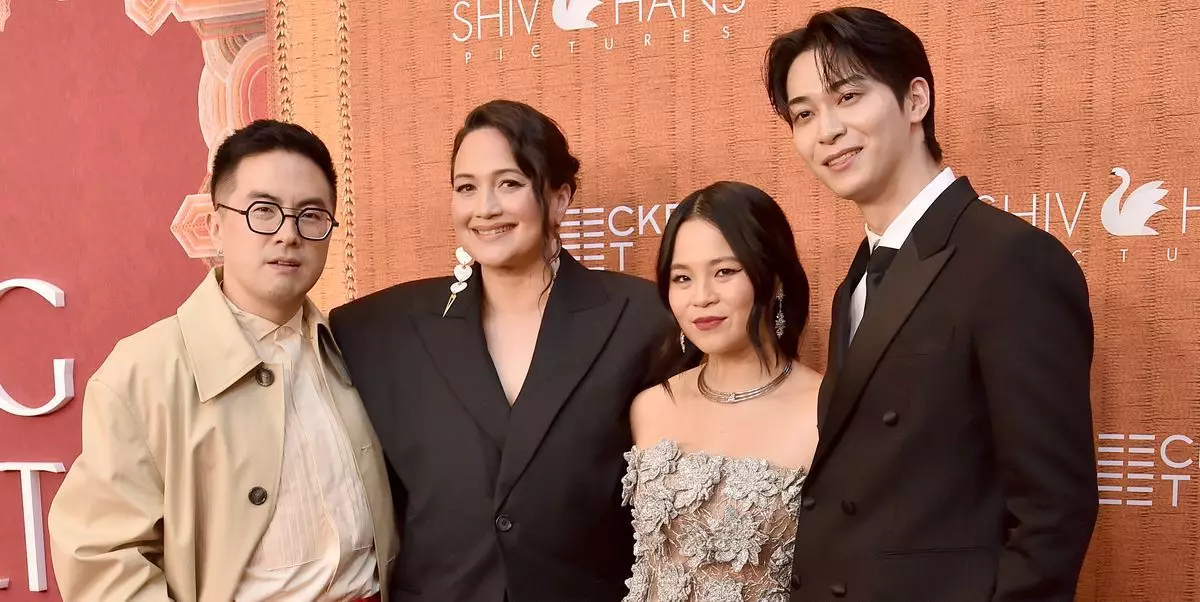In a world that often struggles to embrace the nuances of love and identity, Andrew Ahn’s reimagining of “The Wedding Banquet” triumphantly emerges as not just a film, but a celebration of resilience. This latest creation is an homage to Ang Lee’s 1993 classic, yet it ventures into uncharted territory, offering a fresh perspective on familiar themes. Ahn, celebrated for his work on “Fire Island,” brings warmth and inventiveness, infusing the storyline with relatable modern dilemmas while staying true to the spirit of its predecessor.
The film, which stars an impressive lineup including Kelly Marie Tran, Lily Gladstone, Bowen Yang, Youn Yuh-jung, and Han Gi-chan, unfolds in the vibrant setting of Seattle. Here, four friends embark on a multifaceted journey of love, family dynamics, and cultural expectations that frame their lives. What begins as a convenient arrangement—a green card marriage proposal between closeted Korean heir Min (Gi-chan) and Angela (Tran)—soon spirals into an intricate dance of emotions, traditions, and the meaning of family.
Heartfelt Performances That Resonate
The performances in “The Wedding Banquet” strike a chord, each actor bringing layers to their roles. Lily Gladstone, embodying the character of Lee, relishes the opportunity to explore a range of emotions, from absurdity to sincerity. Her description of the role as enabling her to tap into her comedic chops highlights the film’s playful yet poignant tone. By acknowledging the complexity of Lee’s character—someone who, while functioning as the ‘straight man’ amidst the chaos, reflects depth and authenticity—Gladstone emphasizes how this cinematic narrative allows for growth and laughter in equal measure.
For Kelly Marie Tran, the filming experience was transformative. Her announcement of coming out as queer during production offers a layer of personal investment in her character, intertwining her life with the messages portrayed on screen. Tran’s reflections about this cathartic process reveal a broader significance—the film is not merely entertainment; it serves as a platform for self-acceptance and celebration of identity, urging viewers to embrace every facet of their being.
A Narrative Steeped in Cultural Context
Delving into the screenplay, the collaboration with original writer James Schamus stands out. His involvement ensures that the authenticity and charm of the original resonate throughout the new narrative. Gladstone’s praise for Schamus reveals the movie’s ability to adapt while retaining the essence of its roots. It’s not just a modern retelling but an evolution—a testament to the original’s impact while recognizing the progress made over the decades.
Ahn’s vision extends beyond mere storytelling; he aims to cultivate a supportive environment among the cast and crew, fostering a sense of community that mirrors the themes of the film. Ahn’s passion for filmmaking as a collective effort amplifies the emotional stakes, as he hopes these bonds will enrich the lives of everyone involved. This ethos resonates powerfully throughout the film, making it a celebration of chosen family as much as it is about biological connections.
A Timeless Celebration of Human Bonds
At its core, “The Wedding Banquet” resonates with its exploration of the essence of family and love—transcending conventional boundaries while remaining deeply rooted in cultural identity. As Gi-chan aptly states, it’s not a tale about the right timing; it’s a narrative relevant for all times—a reminder that love, in all its forms, deserves to be celebrated.
Set against a backdrop of vibrant performances and intricate emotional narratives, the film invites viewers to immerse themselves fully. While its theatrical release signals the culmination of an exciting festival run, anticipation swells for the forthcoming availability on streaming platforms. This accessibility ensures that the stories of love and identity explored within “The Wedding Banquet” will reach an even wider audience, freeing them from traditional constraints and allowing diverse stories to flourish.
Indeed, this jubilant reimagining stands as a powerful declaration—proving that the heart of marriage transcends conventions to embrace inclusivity, joy, and unabashed authenticity in every moment of the banquet.


Leave a Reply